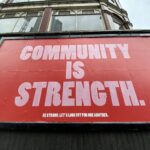This month I am exploring ways to pay attention to Black History. Everyone’s history is everyone’s history if we are all one and equal. Given the difficulty we have had learning accurate Black History, being intentional for a month (or a lifetime) about learning is essential to deepening understanding and advancing equity.
Last week I looked at media and opportunities to learn via movies, music, TV shows, and our friend Google. Today I’d like to look at books and how they help broaden my awareness and shape my behaviors. While the flow of best-sellers on racial justice topics has slowed from the 2021 and 2022 period immediately after George Floyd was murdered, there are plenty of great books to explore.
A few that have opened my eyes and heart include White Fragility by Robin DiAngelo, How to be an Anti-Racist by Ibram X. Kendi, and Isabel Wilkerson’s Caste, recently released as a movie entitled Origin. The first two are basic primers for me about two related ideas- my life as a white person is different and yes “more privileged” than my Black or Brown friends, and for there to be change I need to join those who see themselves as anti-racist. While some may attack these ideas as liberal self-flagellation, to me they get at the root cause of structural racism. We can’t change what we don’t see or know needs changing.
The full title of Isable Wilkerson’s powerful book is Caste: The Origins of our Discontents. She takes readers on a trip that looks at race from the broader lens of caste using terms like “dominant caste”, “favored casted”, “lower caste” and “higher caste”. She draws parallels between America’s experience with race and India’s approach to its untouchables, and the Nazis to Jewish people.
A New York Times book review by Dwight Garner calls this book “superlative” and an important one for this century and summarizes it this way: “Wilkerson has written a closely argued book that largely avoids the word “racism,” yet stares it down with more humanity and rigor than nearly all but a few books in our literature.”
I am eager to see the film Origin. All reviews point to a poignant telling of Wilkerson’s story. A Chicago film reviewer Roger Ebert commends the film’s director Ava Duvernay, one of the few African-American film directors, for her “… increasing command in intermingling collective ache with imperative action.”
Tamara Copeland, a friend and guest contributor, has recently published a book that provides a perfect resource for individuals and groups to explore race in America and what it might mean to be an anti-racist. You may recall Tamara’s guest post in February 2022 Learning About Structural Racism: One Woman’s Journey. In this reposting from her blog Daughters of the Dream, she described her own awakening to the need to pay attention to structural racism.
She wrote: “Until 2012, I didn’t know better. I thought that the civil rights legislation of the 1960s had leveled the playing field. I thought, I, as a Black woman, had opportunities to succeed equal to anyone in America. I was living in an illusion, thinking that some people just didn’t try hard enough, and others needed more education. I believed in a meritocracy. I thought if you dressed a certain way, got a certain level of education, talked a certain way, you could, no, you would get ahead in America. Then Trayvon Martin happened.
It wasn’t just the murder of this unarmed teenager simply walking in his dad’s community. My grief, anger and racial awakening were because this killer was believed – he was afraid, he was attacked, he was simply protecting his community. George Zimmerman was exonerated based on the age-old fear of Black men and the age-old reality of prejudice. That was the wake-up moment for me.”
Tamara’s new book is Revealed: A Once-A-Week Reading to Understand Racism, Prejudice and Bias. This carefully curated selection of her monthly posts is organized in a way to offer anyone, and particularly white people open to learning about race and structural racism, a path to go deeper in learning about our collective ache, and the need for individual and collective action.
Organized as a yearlong series of readings and discussions, Revealed offers short essays on topics ranging from Racial Healing and Missing Pieces of American History to When Did Black Become Beautiful for Me and What Makes Me Hopeful. More than a feel-good history book, Tamara’s call to action includes posts such as What Will You Risk to Fight Racism? and White People, Step It Up.
If you are looking for a way to celebrate Black History Month by learning, I encourage you to buy Revealed and dive in. Read it weekly or as you are led. Take up the invitation to discuss the essays with family and friends or better yet organize a study group. Tamara begins her book with a quote from Maya Angelou “When you know better, do better.” Committing to learning about Black History and working for racial justice is doing better.




0 Comments